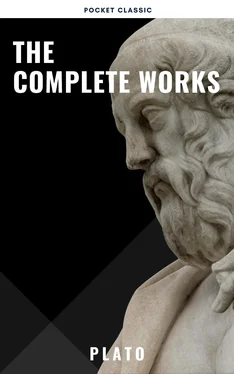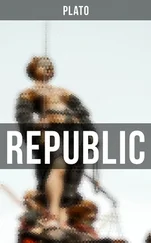Not the same, certainly, replied Prodicus.
Did not Simonides first set forth, as his own view, that ‘Hardly can a man become truly good’?
Quite right, said Prodicus.
And then he blames Pittacus, not, as Protagoras imagines, for repeating that which he says himself, but for saying something different from himself. Pittacus does not say as Simonides says, that hardly can a man become good, but hardly can a man be good: and our friend Prodicus would maintain that being, Protagoras, is not the same as becoming; and if they are not the same, then Simonides is not inconsistent with himself. I dare say that Prodicus and many others would say, as Hesiod says,
‘On the one hand, hardly can a man become good, For the gods have made virtue the reward of toil, But on the other hand, when you have climbed the height, Then, to retain virtue, however difficult the acquisition, is easy (Works and Days).’
Prodicus heard and approved; but Protagoras said: Your correction, Socrates, involves a greater error than is contained in the sentence which you are correcting.
Alas! I said, Protagoras; then I am a sorry physician, and do but aggravate a disorder which I am seeking to cure.
Such is the fact, he said.
How so? I asked.
The poet, he replied, could never have made such a mistake as to say that virtue, which in the opinion of all men is the hardest of all things, can be easily retained.
Well, I said, and how fortunate are we in having Prodicus among us, at the right moment; for he has a wisdom, Protagoras, which, as I imagine, is more than human and of very ancient date, and may be as old as Simonides or even older. Learned as you are in many things, you appear to know nothing of this; but I know, for I am a disciple of his. And now, if I am not mistaken, you do not understand the word ‘hard’ (chalepon) in the sense which Simonides intended; and I must correct you, as Prodicus corrects me when I use the word ‘awful’ (deinon) as a term of praise. If I say that Protagoras or any one else is an ‘awfully’ wise man, he asks me if I am not ashamed of calling that which is good ‘awful’; and then he explains to me that the term ‘awful’ is always taken in a bad sense, and that no one speaks of being ‘awfully’ healthy or wealthy, or of ‘awful’ peace, but of ‘awful’ disease, ‘awful’ war, ‘awful’ poverty, meaning by the term ‘awful,’ evil. And I think that Simonides and his countrymen the Ceans, when they spoke of ‘hard’ meant ‘evil,’ or something which you do not understand. Let us ask Prodicus, for he ought to be able to answer questions about the dialect of Simonides. What did he mean, Prodicus, by the term ‘hard’?
Evil, said Prodicus.
And therefore, I said, Prodicus, he blames Pittacus for saying, ‘Hard is the good,’ just as if that were equivalent to saying, Evil is the good.
Yes, he said, that was certainly his meaning; and he is twitting Pittacus with ignorance of the use of terms, which in a Lesbian, who has been accustomed to speak a barbarous language, is natural.
Do you hear, Protagoras, I asked, what our friend Prodicus is saying? And have you an answer for him?
You are entirely mistaken, Prodicus, said Protagoras; and I know very well that Simonides in using the word ‘hard’ meant what all of us mean, not evil, but that which is not easy—that which takes a great deal of trouble: of this I am positive.
I said: I also incline to believe, Protagoras, that this was the meaning of Simonides, of which our friend Prodicus was very well aware, but he thought that he would make fun, and try if you could maintain your thesis; for that Simonides could never have meant the other is clearly proved by the context, in which he says that God only has this gift. Now he cannot surely mean to say that to be good is evil, when he afterwards proceeds to say that God only has this gift, and that this is the attribute of him and of no other. For if this be his meaning, Prodicus would impute to Simonides a character of recklessness which is very unlike his countrymen. And I should like to tell you, I said, what I imagine to be the real meaning of Simonides in this poem, if you will test what, in your way of speaking, would be called my skill in poetry; or if you would rather, I will be the listener.
To this proposal Protagoras replied: As you please;—and Hippias, Prodicus, and the others told me by all means to do as I proposed.
Then now, I said, I will endeavour to explain to you my opinion about this poem of Simonides. There is a very ancient philosophy which is more cultivated in Crete and Lacedaemon than in any other part of Hellas, and there are more philosophers in those countries than anywhere else in the world. This, however, is a secret which the Lacedaemonians deny; and they pretend to be ignorant, just because they do not wish to have it thought that they rule the world by wisdom, like the Sophists of whom Protagoras was speaking, and not by valour of arms; considering that if the reason of their superiority were disclosed, all men would be practising their wisdom. And this secret of theirs has never been discovered by the imitators of Lacedaemonian fashions in other cities, who go about with their ears bruised in imitation of them, and have the caestus bound on their arms, and are always in training, and wear short cloaks; for they imagine that these are the practices which have enabled the Lacedaemonians to conquer the other Hellenes. Now when the Lacedaemonians want to unbend and hold free conversation with their wise men, and are no longer satisfied with mere secret intercourse, they drive out all these laconizers, and any other foreigners who may happen to be in their country, and they hold a philosophical seance unknown to strangers; and they themselves forbid their young men to go out into other cities—in this they are like the Cretans— in order that they may not unlearn the lessons which they have taught them. And in Lacedaemon and Crete not only men but also women have a pride in their high cultivation. And hereby you may know that I am right in attributing to the Lacedaemonians this excellence in philosophy and speculation: If a man converses with the most ordinary Lacedaemonian, he will find him seldom good for much in general conversation, but at any point in the discourse he will be darting out some notable saying, terse and full of meaning, with unerring aim; and the person with whom he is talking seems to be like a child in his hands. And many of our own age and of former ages have noted that the true Lacedaemonian type of character has the love of philosophy even stronger than the love of gymnastics; they are conscious that only a perfectly educated man is capable of uttering such expressions. Such were Thales of Miletus, and Pittacus of Mitylene, and Bias of Priene, and our own Solon, and Cleobulus the Lindian, and Myson the Chenian; and seventh in the catalogue of wise men was the Lacedaemonian Chilo. All these were lovers and emulators and disciples of the culture of the Lacedaemonians, and any one may perceive that their wisdom was of this character; consisting of short memorable sentences, which they severally uttered. And they met together and dedicated in the temple of Apollo at Delphi, as the first-fruits of their wisdom, the far-famed inscriptions, which are in all men’s mouths—‘Know thyself,’ and ‘Nothing too much.’
Why do I say all this? I am explaining that this Lacedaemonian brevity was the style of primitive philosophy. Now there was a saying of Pittacus which was privately circulated and received the approbation of the wise, ‘Hard is it to be good.’ And Simonides, who was ambitious of the fame of wisdom, was aware that if he could overthrow this saying, then, as if he had won a victory over some famous athlete, he would carry off the palm among his contemporaries. And if I am not mistaken, he composed the entire poem with the secret intention of damaging Pittacus and his saying.
Читать дальше












